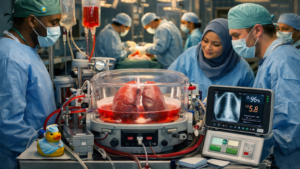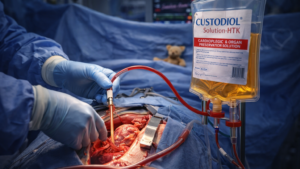Cardiothoracic surgery using cardiopulmonary bypass (CPB) triggers an inflammatory state that may be difficult to differentiate from infection. Heparin-binding protein (HBP) is a candidate biomarker for sepsis. As data indicates that HBP normalizes rapidly after cardiothoracic surgery, it may be a suitable early marker of postoperative infection. We therefore aimed to investigate which variables influence postoperative HBP levels and whether elevated HBP concentration is associated with poor surgical outcome. This exploratory, prospective, observational study enrolled 1475 patients undergoing cardiothoracic surgery using CPB, where HBP was measured at ICU arrival. Patients with HBP in the highest tercile were compared to remaining patients. Multivariable logistic regressions were performed to identify factors predictive of elevated HBP and 30-day mortality. Overall median HBP was 30.0 ng/mL. Patients undergoing isolated CABG or surgery with CPB-duration ≤ 60 min had a median HBP of 24.9 ng/mL and 23.2 ng/mL, respectively. Independent predictors of elevated postoperative HBP included increased EuroSCORE, prolonged CPB-duration and high intraoperative temperature. Increased HBP was an independent predictor of 30-day mortality. This study confirms the promising characteristics of HBP as a biomarker for identification of postoperative sepsis, especially after routine procedures. Further studies are required to investigate whether HBP may detect postoperative infections.







